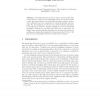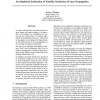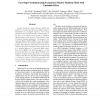236 search results - page 6 / 48 » Learning How to Propagate Using Random Probing |
SOFSEM
2001
Springer
15 years 6 months ago
2001
Springer
Knowledge discovery, that is, to analyze a given massive data set and derive or discover some knowledge from it, has been becoming a quite important subject in several fields incl...
102
click to vote
UAI
2004
15 years 3 months ago
2004
As real-world Bayesian networks continue to grow larger and more complex, it is important to investigate the possibilities for improving the performance of existing algorithms of ...
129
click to vote
ICIC
2005
Springer
15 years 7 months ago
2005
Springer
Rather than the difficulties of highly non-linear and non-Gaussian observation process and the state distribution in single target tracking, the presence of a large, varying number...
119
click to vote
ACL
1994
15 years 3 months ago
1994
This paper shows how to formally characterize language learning in a finite parameter space as a Markov structure, hnportant new language learning results follow directly: explici...
102
Voted
ICPR
2008
IEEE
15 years 8 months ago
2008
IEEE
In patch based face super-resolution method, the patch size is usually very small, and neighbor patches’ relationship via overlapped regions is only to keep smoothness of recons...



